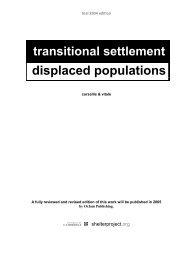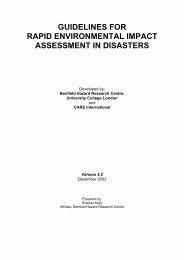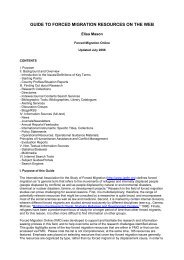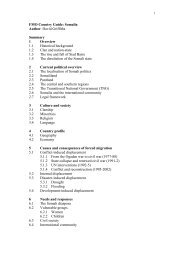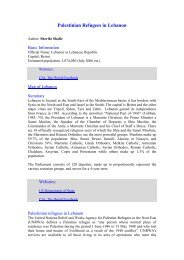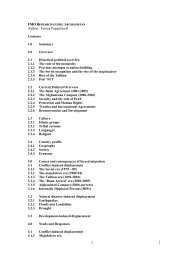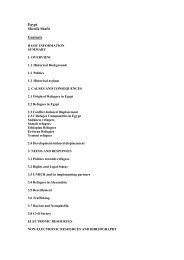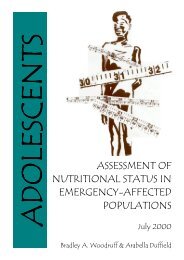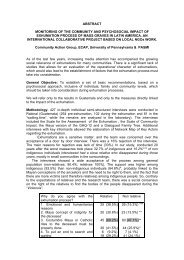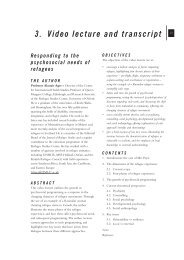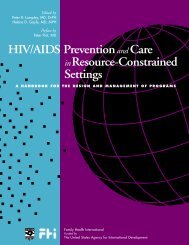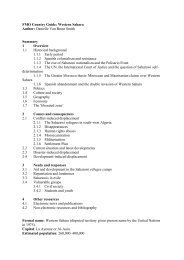FMO Country Guide: Ethiopia - Forced Migration Online
FMO Country Guide: Ethiopia - Forced Migration Online
FMO Country Guide: Ethiopia - Forced Migration Online
Create successful ePaper yourself
Turn your PDF publications into a flip-book with our unique Google optimized e-Paper software.
<strong>Ethiopia</strong> has a major problem with landmine/UXO contamination resulting from the<br />
number of conflicts dating back to the Italian occupation. Estimations of the total number<br />
of landmines laid in the country vary greatly. According to US government estimates,<br />
about twenty-one different types of landmines have been found in the country, and the<br />
number of UXO pieces is said to be between half a million to 1 million, most of which<br />
are found in the northern part of the country (Deisser 1999). <strong>Ethiopia</strong> is also known as the<br />
first country to have borrowed money to undertake de-mining activities.<br />
In February 2001, GFDRE established a civilian de-mining office, EMAO, to deactivate<br />
explosives, educate the public and prevent injuries and deaths resulting from mines. The<br />
Emergency Recovery Program Management Unit, in close collaboration with EMAO,<br />
implements the World Bank-supported de-mining project. The project mainly focuses on<br />
building national capacity through technical training and provision of required<br />
equipment. Among the major interventions in this sector is the training of de-miners by<br />
the US Department of State, which granted a total of US$1.6 million towards the training<br />
program. Close to 200 combatant engineers were selected and trained in humanitarian demining,<br />
upon their release from the Ministry of National Defense. The training was<br />
conducted in two phases by an American organization called RONCO. Advanced training<br />
as well as facilitation of deployment was later provided by EMAO. EMAO was also<br />
engaged in mapping out mine-infested areas based on the National Landmine Impact<br />
Survey, analyzing the type of mines and the general socio-economic conditions of the<br />
areas. The Rehabilitation and Development Organization (RaDO), in close collaboration<br />
with UNICEF and UNDP, has also been engaged in sensitization and mine-awareness<br />
through Mine Risk Education activities. UNDP’s ‘Support to the <strong>Ethiopia</strong>n Mine Action<br />
Program’ also compliments the effort by following up on international technical<br />
assistance for quality assurance and management training.<br />
As was the case for the infrastructure-rebuilding part of ERP, the road-construction<br />
program also experienced some difficulties. The program is implemented in close<br />
collaboration with ERA and EEPCO. Most of the activities undertaken under this<br />
component were mainly preparatory works on roads and electric power sub-components<br />
that were implemented during the first years of the program, conducted through the ERA<br />
and EEPCO at the federal level.<br />
USAID-funded Border Development Program (BDP)<br />
The BDP focused on two of the highly affected woredas in eastern Tigray—Irob and<br />
Gulomekeda—and complemented the ERP. It was implemented by three international<br />
NGOs, namely Catholic Relief Services (CRS), Cooperazione Internazionale (COOPI),<br />
and Agricultural Cooperative Development International and Volunteers in Overseas<br />
Cooperative Assistance (ACDI/VOCA), along with REST.<br />
The first phase of the program, valued at US$4.6 million, focused on house construction,<br />
distribution of household utensils, construction of destroyed/damaged socio-economic<br />
infrastructures, and awareness-raising on landmines and HIV/AIDS. Implementation of<br />
the second phase of the program, which focuses on confidence-building to facilitate the<br />
commencement of cross-border trade, is awaiting the final border demarcation.<br />
13



